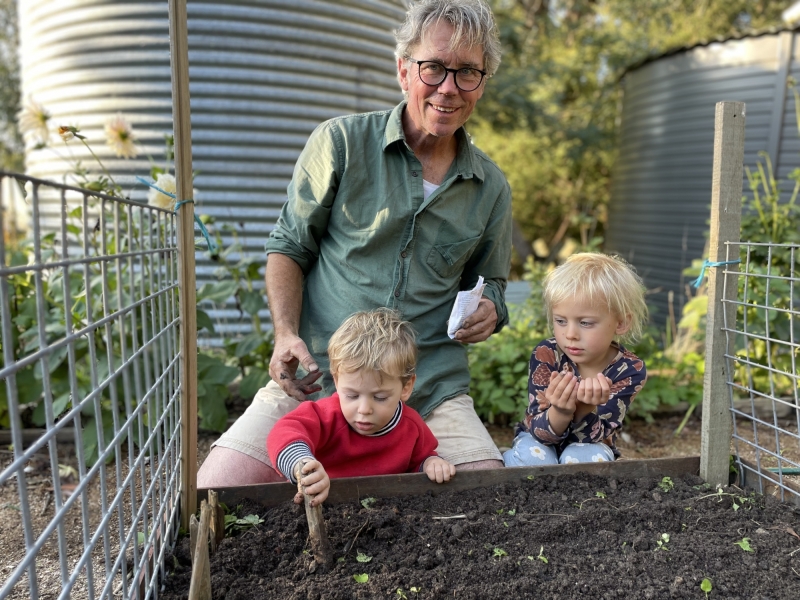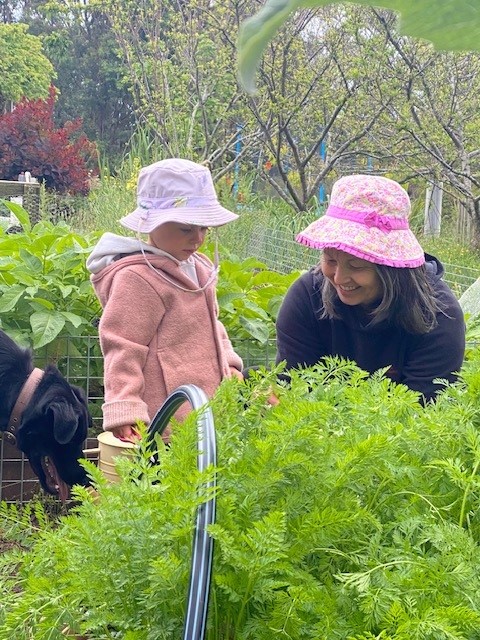There’s something to be said about a mature gardener’s confident pace in nature. There’s no rush. Just like an inquisitive young child, a skilled gardener with time on their hands stops to notice the micro details of a patterned leaf or catches a ray of sunlight striking a forgotten corner of the yard.
This shared outlook is the perfect starting point for older adults to introduce the wonderful world of growing and harvesting to a very eager and willing next generation. Intergenerational garden education ensures plant information, traditional agricultural knowledge, gardening skills and cultural practices are passed along to younger generations, with new knowledge and techniques often flowing upstream from budding green thumbs.
These rich moments of exchange can boost psychological wellbeing, help counter ageism and break the ‘monolingual mindset’ through exposure to cultural heritage and language. The cumulative effects of these age-spanning experiences foster inclusive, age-friendly communities.
As the Journal of Early Childhood Education Research explains, “Intergenerational programs unite the young and old in shared activities to foster positive relationships across generations, reducing loneliness caused by living in residential care and improving children’s attitudes toward the elderly.”
At the Stephanie Alexander Kitchen Garden Foundation, we often see the benefits of intergenerational gardening sprouting from our Kitchen Garden Program. Supported by our partnership with The Diggers Foundation through heirloom seed donations, this program operates in over 1,000 schools and early childhood services across Australia.
Most of these schools and services have volunteers who are parents, grandparents or seniors. Volunteering in a kitchen garden offers an alternative pathway for mature adults to reconnect with the community and share their wisdom with children and young people through the joy of growing, harvesting, preparing and sharing fresh, delicious produce.
Mary-Ann De Carlo, an educator at Collingwood College in Victoria, explains the effects she saw from having mature-age volunteers lend a hand.

“Some students who may have had issues in the classroom with their peers formed these lovely relationships with the volunteers. It was very special. Students can have a relationship with an adult who isn’t a teacher; it’s almost like a grandparent relationship, a mentor or a family friend.”
More than just volunteering, the Kitchen Garden Program opens avenues for deeper cross-generational connections. At John Pujajangka Piyirn Catholic School, located in a small Indigenous community in the Kimberley region of Western Australia, students from Kindergarten to Year 6 utilise their drought-tolerant garden to grow fresh, organic produce, which they prepare, cook and deliver weekly to the Elders in their community.
Many of the Elders are the students’ carers. The Kitchen Garden Program has been integrated into the community’s kinship system, providing children with the opportunity to nurture their Elders and foster stronger bonds and togetherness.
In another climate zone entirely, the student body at St Joseph’s Primary School in regional Victoria has elevated their Kitchen Garden Program with a connection between students and the local residential aged care centre. Elderly residents visit St Joseph’s for an afternoon tea of scones and hot beverages. Together with their special guests, the students garden, exchange tips, chat and help each other cook. In return, students visit the aged care centre to help with gardening, sing, and play board games.
There are endless adventures for old and young to share down the garden path. Make a treasure hunt through a sprawling edible garden, collect hollow sticks to make an insect hotel or simply track a beetle on its journey through the undergrowth. And in the kitchen, share memories through the preparation of vegetables, herbs, edible flowers and fruit from the garden to help recall family recipes and food traditions.
The sensory immersion of stirring a pot of fragrant stew, filling soft pasta dough with wilted leaves and fresh curds and, of course, tasting each step of the way, are all bonding rituals that span generations and spark a common language, no matter your date of birth.
Read more
Gardening with grandchildren webinar Monday 6 October, 7pm Join our guest, Kate Beckwith from the Stephanie Alexander Kitchen Garden Foundation, to discover the delights of intergenerational gardening.
